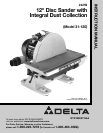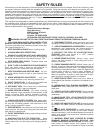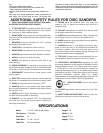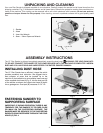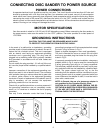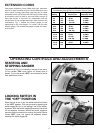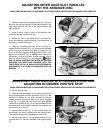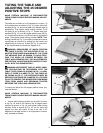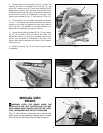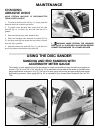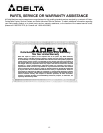
6
Fig. 7
EXTENSION CORDS
Use proper extension cords. Make sure your extension
cord is in good condition and is a 3-wire extension cord
which has a 3-prong grounding type plug and a 3-pole
receptacle which will accept the tool’s plug. When using
an extension cord, be sure to use one heavy enough to
carry the current of the tool. An undersized cord will
cause a drop in line voltage resulting in loss of power and
overheating. Fig. 7, shows the correct gauge to use
depending on the cord length. If in doubt, use the next
heavier gauge. The smaller the gauge number, the heav-
ier the cord.
OPERATING CONTROLS AND ADJUSTMENTS
Fig. 8
Fig. 9
STARTING AND
STOPPING SANDER
The switch (A) Fig. 8, is located on the top of the motor.
To turn sander “ON” move switch (A) toward rear of
sander. To turn the sander “OFF” move switch (A) to the
front position as shown.
LOCKING SWITCH IN
THE “OFF” POSITION
When the tool is not in use, the switch should be locked
in the “OFF” position. This can be done by grasping the
switch toggle (B) Fig. 9, and pulling it out of the switch,
as shown. With the switch toggle (B) removed, the switch
will not operate. However, should the switch toggle be
removed while the machine is running, the switch can be
turned “OFF” once, but cannot be restarted without
inserting the switch toggle (B).
A
B
MINIMUM GAUGE EXTENSION CORD
RECOMMENDED SIZES FOR USE WITH STATIONARY ELECTRIC TOOLS
Ampere Volts Total Length of Gauge of
Rating Cord in Feet Extension Cord
0-6 120 up to 25 18 AWG
0-6 120 25-50 16 AWG
0-6 120 50-100 16 AWG
0-6 120 100-150 14 AWG
6-10 120 up to 25 18 AWG
6-10 120 25-50 16 AWG
6-10 120 50-100 14 AWG
6-10 120 100-150 12 AWG
10-12 120 up to 25 16 AWG
10-12 120 25-50 16 AWG
10-12 120 50-100 14 AWG
10-12 120 100-150 12 AWG
12-16 120 up to 25 14 AWG
12-16 120 25-50 12 AWG
12-16 120
GREATER THAN 50 FEET NOT RECOMMENDED



